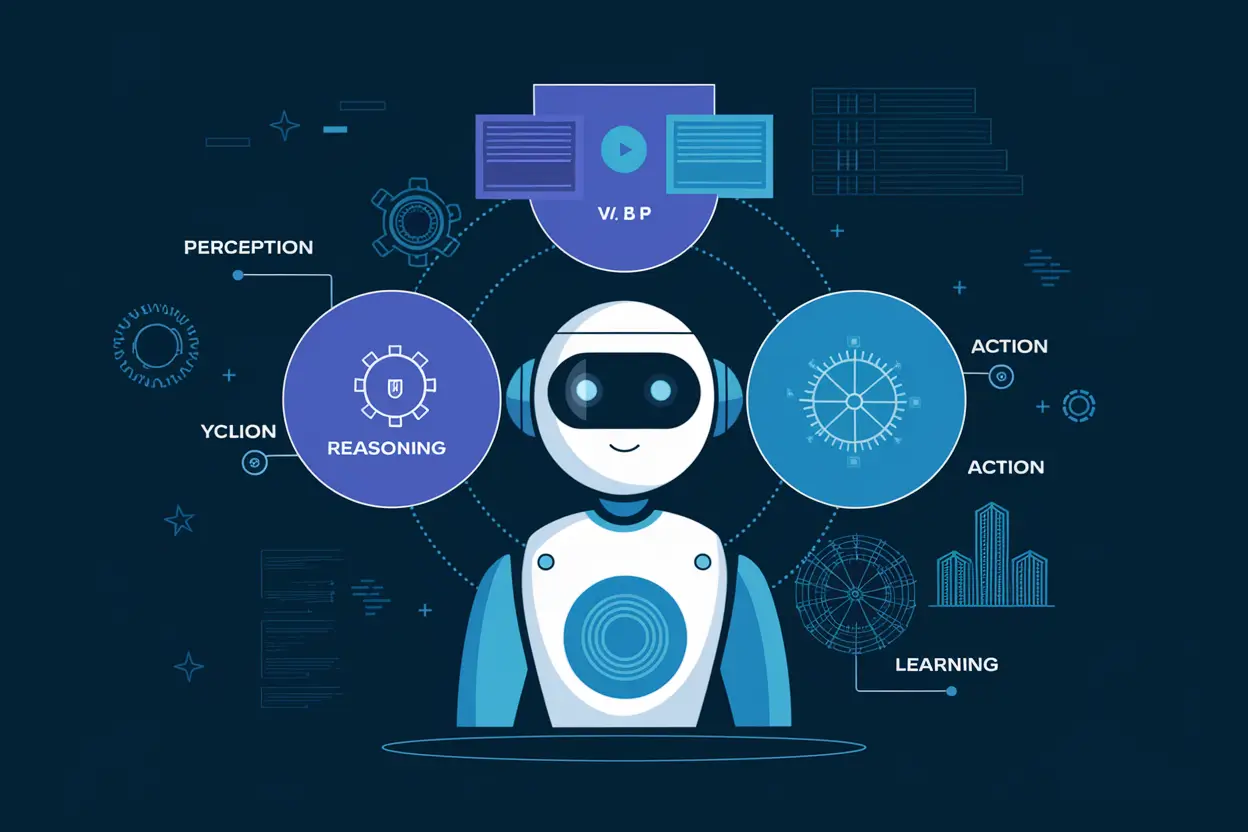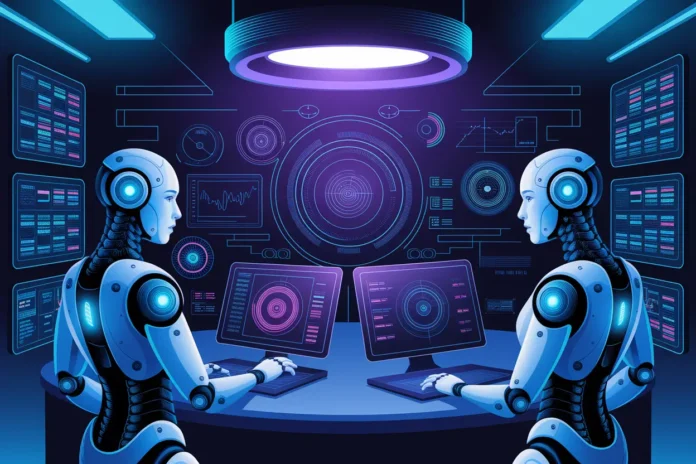AI Agents are the backbone of modern intelligent systems, defining a new era of automation, interaction, and decision-making based on real-time data processing. These software entities perceive their environment, reason with gathered data, make decisions autonomously, and act to achieve specific goals—ranging from simple tasks to complex adaptive behaviors. This article explores the multifaceted nature of AI agents, how they function, their real-world applications, current trends, and implementation strategies.
What Are AI Agents?
AI agents are autonomous software systems designed to perceive their environment, process data, make decisions, and execute actions to achieve specified objectives. They vary in complexity, from predefined rule-based behavior to sophisticated models capable of learning and evolving. Their key characteristics include:
- Autonomy: Operation without continual human guidance.
- Reactivity: Rapid response to environmental changes.
- Proactivity: Initiative-driven actions to meet objectives.
- Social Ability: Interaction with humans or other agents effectively.
Understanding the Functionality of AI Agents
AI agents work on a loop of perception, reasoning, action, and learning. This ongoing cycle enables them to adapt and operate effectively in dynamic environments.
1. Perception
Agents collect data from the surrounding environment using sensors, user inputs, or digital streams. For instance, a chatbot interactions are inputs it perceives to act upon.
2. Reasoning & Planning
Collected data is analyzed using algorithms such as decision trees or machine learning models. The agent evaluates possible choices to plan its response intelligently.
3. Action Execution
Upon selecting the optimal course of action, the agent executes the activity. This could be a system command, verbal response, or robotic movement.
4. Learning Capability
Advanced AI agents track outcomes and adjust their behavior over time. This self-improvement loop refines future decisions and fosters better outcomes.
Types of AI Agents
AI agents can be categorized based on their sophistication and operational strategy:
- Simple Reflex Agents: Act solely based on the current perception, without memory.
- Model-Based Reflex Agents: Use internal models to interpret partially visible contexts.
- Goal-Based Agents: Evaluate options based on which actions fulfill predefined objectives.
- Utility-Based Agents: Make choices that maximize a defined utility function.
- Learning Agents: Continuously improve by applying data from past decisions to future ones.
Benefits of Using AI Agents
Organizations and developers leverage AI agents for several reasons. These include:
- Efficiency: Automates repetitive or time-consuming operations.
- Scalability: Manages thousands of simultaneous inputs with consistent performance.
- Consistency: Delivers predictable and stable responses, reducing human error.
Challenges and Limitations of AI Agents
Despite numerous advantages, AI agents face certain obstacles:
- Complex Implementation: Development and deployment require significant resources and expertise.
- Limited General Understanding: Agents often falter in ambiguous or emotionally nuanced situations.
- Ethical Concerns: Who is accountable when an autonomous decision misfires?
Use Cases of AI Agents
AI agents are transforming industries with real-world applications:
- Customer Support: AI chatbots respond to queries, process claims, schedule support calls.
- Finance: Agents evaluate transactions, detect fraud, and provide portfolio recommendations.
- Autonomous Vehicles: Self-driving cars utilize perception and decision layers to operate safely.
- Manufacturing & Automation: Agents monitor equipment, optimize production, and manage supply chains.
- Insurance: Automate claims handling, policy adjustments, and risk evaluations.
Latest Trends in AI Agents
Innovation continues to expand the capabilities of AI agents:
- Agentic AI: Fully autonomous reasoning and long-term planning integration.
- Multi-Agent Systems: Teams of agents that collaborate toward macro-level strategic goals.
- Large Language Model Integration: Combines AI logic with advanced natural language understanding and generation models.
Technical Implementation of an AI Agent
A basic AI agent framework includes environment definitions, sensory inputs, decision modules, and actuators. Below is an example of a simple reflex agent coded in Python:
Code Example:
<Environment and Agent code shared in the original data>

AI Agents vs Traditional Software
Unlike predefined software that acts as coded, AI agents dynamically interpret data and self-adjust. Below is a comparison:
| Feature | Traditional Software | AI Agents |
|---|---|---|
| Responsiveness | Static | Dynamic |
| Learning Abilities | None | Adaptive over time |
| Human Intervention | High | Low |
Common Mistakes in Building AI Agents
When designing or deploying AI agents, developers often encounter missteps:
- Ignoring edge cases that can confuse the agent’s logic.
- Overcomplicating models without sufficient data to support learning.
- Lack of transparency leading to non-auditable decision-making.
How to Design and Train a Learning AI Agent
Follow this step-by-step framework:
- Define the environment and the problem domain.
- Gather input sources (data, sensors, APIs).
- Design decision models—rules, machine learning, or a hybrid.
- Test with multiple scenarios to refine behavior.
- Integrate feedback learning for continuous improvement.
Future of AI Agents
The field of AI agents is poised for radical transformation. The future suggests:
- Greater Autonomy: Agents will handle ever more complex decision layers independently.
- Human-Agent Collaboration: Enhanced interaction modes such as voice, emotion detection, and complex multi-modal AI.
- Governance & Ethics: Reliable frameworks for transparency, bias mitigation, and accountability will emerge.
FAQs About AI Agents
What distinguishes AI agents from traditional software?
AI agents operate autonomously, reason with data, learn over time, and adapt actions to achieve goals, unlike static traditional software programs.
Are AI agents always connected to the internet?
Not necessarily. Some agents operate in closed environments or edge devices, though many leverage cloud data or networked systems.
Can AI agents collaborate?
Yes, especially in Multi-Agent Systems where agents share roles, communicate, and coordinate tasks.
What industries benefit most from AI agents?
Finance, healthcare, e-commerce, automotive, and customer service sectors currently lead in adopting AI agents.
Are AI agents safe for decision-making?
When designed properly with ethical oversight and testing, AI agents are reliable for many tasks but still require human-in-the-loop mechanisms for critical decisions.



